- Home
- Tim Greaton
Under-Heaven Page 4
Under-Heaven Read online
Page 4
My father worked hard at his new career as a lobster-man, but making a living was never easy, and that combined with what my father called “competition with all the kids coming back from the war” made things especially tough. My mother said President Roosevelt had changed a lot of things to help poor people, but I couldn’t see that he had helped my parents very much. Even so, my mother adored President Roosevelt. When he had died two months earlier she had cried for an entire afternoon. Just a month later, when the war with Hitler ended, she cried again because, “Our dear president died too soon to see Germany surrender.”
I desperately wanted to get into the back yard—after all, my dog was waiting—but I knew my father would just call me back. Respect for your elders came first in my family. I tried to calm my hound-wrestling instincts. Whiskey would just have to wait for another minute or two. My father pulled two pieces of new twine into a knot. Finally, he looked up and said, “How was the last day of school?”
“Okay, I guess,” I shrugged, “but Tommy Edds spit on my seat again.”
“Why?”
“Like always, he said I was a flatlander and that I should go back to flatness where I belonged.” By Maine standards, flatlanders were just about anybody that came from outside of the state of Maine, though people from New Hampshire fared better in Mainers’ minds than flatlanders from other places. We, unfortunately, had come from Rhode Island where my father had lost his job at a bank over three years before. We may as well have been from the East Indies, though. Most Mainers joked about flatlanders and didn’t mean anything by it, but fishermen were a different breed. To them, flatlanders were invaders, and my father was the worst invader of all because he was out on their sea pulling their lobsters.
My father’s lips thinned, but he did his best to hide his anger. “Kids say some mean things sometimes, Nate. They’ll get used to us in another year or two.”
I didn’t bother to mention the obvious: that we had already been in Coldwell for three years and still weren’t welcome. I knew my father was having the same trouble on the docks. Though he and Mom never talked about it in front of my sister or me, someone had been cutting my father’s traps loose at sea, and last week a dozen of his traps behind our house had been torn up. One thing was certain, the Maine lobstermen hadn’t welcomed my father to their shore any more than their kids had welcomed me to their classroom.
“It’s okay, Dad,” I said. “Most of the kids are nice anyway.”
The truth was that only two of the kids at school
were nice to me, and they were both girls. One was Gracey Vachon, and though her parents had been in Coldwell for over twenty years, she also got called “flatlander” a lot. It apparently didn’t matter that she had been born in Maine. The other girl was Trudy Jackson. Her father was a fisherman, but she had liked me ever since Whiskey and I chased a skunk out of her yard a few months before. It had probably crawled back under her barn later that night but our friendship held. The other kids either ignored me or picked on me.
“Did you see a sheriff’s car on your way home?” my father asked.
“Nope.” I said, suddenly alert.
Something was up, probably something to do with the other lobstermen. My father wasn’t the type to come home from work early unless it was serious. And to call the police was about as serious as things could get in a small, shoreline town. I’d only seen a sheriff in Coldwell three times since we had moved here, twice because people died of old age, and once when a bear got stuck in the Gradshaw’s basement window the previous spring.
“It’s nothing, son, but when you see the sheriff pull in the yard, why don’t you take Whiskey out for a run? I’d like some privacy when I talk to him, okay?”
“Okay,” I said. Though I was curious, being a kid sometimes meant you had to wait for information. Besides, I had a dog to see. My father returned to his trap repair while I rushed into the kitchen and pecked my mother on the cheek. I would have been embarrassed to do that in front of the kids from school, but it was a chore I secretly enjoyed when there was no shame to be found.
“Hi, Mom; Bye, Mom,” I said as I bolted out into the backyard.
“Nice to see you, too, son,” she called after me. I could hear the laughter in her voice.
Like a reddish-blond cyclone, Whiskey hit me chest high and sent me sprawling on my back. I rolled to catch him in a chokehold, but he was too smart for that. By the time I swung my arm around for my famous dog-wrestling move, he had jumped back out of arms’ reach. There we were, two adversaries eyeing each other, each trying to guess the other’s next move. It occurred to me that a certain ball of fur had already bested me; after all, I was lying on my side in the grass, and he was standing comfortably on all fours just a few feet away. He’d been planning this, I thought, and I knew my only chance of winning would be to trick him.
“Okay, you win,” I said, rolling to my feet and brushing grass from my blue jeans and button-up, plaid school shirt. “You’re too smart for me.”
Whiskey let out a little yelp and pawed the ground. He swayed his neck back and forth staring at me. His hind legs were slightly crouched. He was ready to pounce.
“No, Whiskey, you win,” I said, shaking my head. “I’m not going to fight you anymore.”
His head stopped swaying, but his rear legs were still in a crouch. He wasn’t buying it. I knew this was going to call for drastic measures, so I turned and took two steps back toward the kitchen door.
“Whulp, whulp?” came the question.
I glanced back just long enough to say, “I told you, it’s over. You win.”
I was another step and a half toward the door when a familiar flank appeared beside me. With a shameless lack of honor, I dove on his back and snaked my arm around his neck in my famous dog-wrestling move. We fell to the ground in a heap with me on top.
He gave only one final “whulp” before licking my cheek.
Once again, boy had proven victorious over dog.
In retrospect, I think Whiskey was smarter than I gave him credit for that day. I think he was just letting me win, one of his many ways of showing me how much he loved me. At the time, neither of us knew how little time we had left.
6
A Colorful Friend
The trembling had subsided only a little by the time my grandmother arrived the next morning. Though her brow was wrinkled with concern, I was glad she said nothing as she hugged me and settled onto the kitchen chair beside me to start our lesson. That day, I was to learn about archangels, the original angels and guardians of Heaven. I listened as well as I was able but found it hard to concentrate. I couldn’t get the vision of that ominous prison door out of my head, only now the door had a crack running halfway up from the bottom. I could hear my monster gouging at the steel from the other side. It wanted out, it wanted me.
Not for the first time, I wondered if my fear would subside if I could somehow find a way to leave my Under-Heaven. Grandma Clara had explained that though there was only one Heaven, there were so many levels of Under-Heaven that I would never be able to count them all even if I had a math teacher to help. Most of the people in my Under-Heaven seemed to remain there only for a few days, or on rare occasions maybe even a month. In contrast, I had been there for three solid months. It might have felt less like a prison if I didn’t wake each morning with a constant sense of fear. I’d often thought it might have been easier if there were other kids to play with. Unfortunately, children were seldom placed in the same Under-Heaven—something about peer pressure, my grandmother had once tried to explain. All I heard, however, was that my prison sentence wasn’t going to get any easier.
As always, I grimaced at the thought that I had trapped my memories much the way I myself was trapped.
I am the monster!
“So the archangels spend a lot of their time in the Under-Heavens,” Grandma Clara was saying, “making sure the pure souls are not mistreated when the demons come for the unlucky—”
She gasped.
“Are demons really that scary?” I asked.
“No—I mean, yes they are but….” Her voice trailed off as she stared out my large kitchen window.
I turned and was shocked to see a red-haired boy, maybe about eight years old, running past my front porch. I couldn’t help the smile that spread across my face. I was just standing to get a better view of him racing through the grass a couple of doors down when my grandmother tapped the table.
“Nate.”
I immediately settled back into my seat but couldn’t stop my feet from tapping the floor as she tried to renew our lesson. She tried to explain that archangels were the only angels allowed to interact with new souls across family lines. “…so that’s why family angels don’t usually mingle on the grass or near the fountain pool.”
I chanced a quick look out the window but couldn’t see the redheaded boy anywhere.
“And they serve ice cream to the singing goats,” she said.
I focused on her again and nodded.
“Ice cream…goats.”
“Huh?”
She shoved her chair back and got to her feet. I stood and fought the urge to look out the window again.
“That is why children shouldn’t be grouped together.” She pointed toward the floor at my feet.
I looked down, and when I didn’t see anything gave my grandmother a confused look.
“Nate,” she said, “are you going to tell me you didn’t notice the color of your sneakers?”
Excited thoughts about the new boy in my neighborhood melted faster than ice on a fire as I glanced down again. Sure enough, my sneakers were black…and black was just as bad as any other color.
You see, in Under-Heaven everyone’s clothing changes color in response to how much guilt they harbor. White clothing and white shoes means you are guilt-free and will likely move on to Heaven-proper. Anything other than white, however, means you have varying degrees of guilt. And with enough color, a soul might well become one of the damned. According to Grandma Clara, if a person’s color is dramatic enough, demons can nab you at any time. Usually, though, they prefer darkness and will steal unlucky souls from their beds.
Though I’d never actually seen a demon, I often heard screams at night as some of my more colorful neighbors were forcibly relocated. By morning, they and their homes would be gone. Sometimes other homes with other residents might have appeared, but often the vacant spaces just became more beautiful grass—
Grass that the new boy and I can play in.
Even as the thought crossed my mind, I could feel color wicking up into my ankles. I stole another glance and, sure enough, the tips of my white jean pant legs were beginning to turn blue. Having my grandmother staring at me from across the room didn’t help, but even that added guilt couldn’t quash my intense desire to meet this new boy. His arrival was easily the most exciting thing that had happened since I had arrived in my unusual new neighborhood.
With a sigh of resignation, my grandmother pushed her chair in. I braced myself for—for what, a punishment, extra lessons? But my Grandma Clara’s puckered brow turned into a gentle smile. She pointed toward my feet, which I suddenly wished were hidden under the table again.
“I’m worried about that color,” she said. “But it’s hard to deny that smile of yours.” She turned toward the window. “Just promise me you’ll be careful.”
My chest was tight with excitement. Was she saying what I thought she was?
“First, come on over here,” Grandma Clara said. She turned to look out my large kitchen window.
I joined her at the counter and followed her gaze out the window. There on the far side of beautiful cherub fountain I could see the redheaded boy running across the grass with his arms spread like the wings of an airplane. Other than myself, I had never before seen anyone run in Under-Heaven. The sight made me even more excited to meet him.
“What do you see?” Grandma Clara asked.
Was this a trick question? The boy soared across the grass, swooping first left then right. He was running and playing, having a great time. I should have been right there beside him.
“Look at his shoes and pants, Nate.”
Suddenly, I saw what she had been trying to point out. The boy continued to run but rather than picturing myself with him, all I could see were his blue sneakers and pants that were tan almost to his waist. The exhilaration I’d been feeling drained away like water from a rusted bucket. If my understanding of color in Under-Heaven was true, the redheaded boy might soon be on his way to Hell.
When my grandmother had first explained the color system to me, I thought it was the silliest thing I’d ever heard. It seemed obvious that all a person needed to do was take off their colored clothes and change into white clothes: problem solved. The demons would be fooled, and life in Under-Heaven could continue. But there were a few problems with my theory. First, there were no changes of clothes in Under-Heaven. A person retained only the clothing they arrived in. Our bedrooms had no closets or bureaus to store garments in, and there weren’t any stores at which to purchase new outfits. But even if we did have other changes of clothes, it wouldn’t have mattered because in Under-Heaven your clothes changed colors on their own. For instance, whenever I thought about slipping out of my house early before Grandma Clara arrived to give my lessons, my sneakers would begin to turn black. It was as though my clothing could actually read the level of guilt I felt. The one time I actually did skip a lesson, by the time my grandmother found me hiding behind a house two doors down, my sneakers had already turned black and the bottoms of my pant legs had begun to turn blue.
Other than those few occasions, I had never personally been concerned with the color code in Under-Heaven. My clothing had always remained pretty much white all the time. And, my few brushes with color had only lasted for a few minutes before my clothes turned white again. The only color that stayed with me since arriving in Under-Heaven was the bright red stain on the left shoulder of my tee shirt. The two times I had ignored the monster in my mind to ask Grandma Clara about it, she had shuffled the question aside, something she was especially adept at doing.
So there I stood crestfallen to think that a boy even younger than me might have to go to Hell. I didn’t know what he could have done that was so bad, but as I watched him race across the grass I knew I had to at least talk to him.
“Just this once?” I asked my grandmother.
She encircled my waist with her arms and kissed me on the cheek. Normally, I would have pulled gradually away but this time I let her hug me for as long as she wanted. The thought of a boy my age going to Hell was enough to make me appreciate the comfort.
“You go ahead and meet that boy,” she told me. “But you keep an eye on your colors. Promise me.”
I dared a brief glance down at my sneakers and was relieved to see they had returned to their typical white tone. So far I was safe. I nodded.
“Now that that’s settled,” she said, “I have some important people to see. I don’t know what fool approved of both you boys being in the same Under-Heaven, but I’m going to give them a good talking to—of that you can be sure.”
Glad I wasn’t that person, I hugged my grandmother one more time and hurried outside to introduce myself to my new young neighbor.
It took all of two seconds for the redheaded boy and me to become fast friends. That first day, we played right up until dark, right up until a kindly man with glasses, a white beard and a cane called for Ricky from one of the front porches on the opposite side of our circular neighborhood from my house. The man was, of course, dressed entirely in white. Not daring to bring it up when we first met, I had completely forgotten about Ricky’s little problem. I glanced down and was pleased to see the tan color in his pants had dropped to knee level. Maybe he had nothing to worry about after all.
“That’s my Uncle Sedrick,” Ricky said as we jogged up to his house. He introduced us.
“It’s nice to meet you, Nat
haniel.”
“You, too,” I said, feeling awkward to be talking to an adult other than my grandmother. Since I’d arrived in Under-Heaven, I had stayed pretty much to myself. I waved to both him and Nate and ran back home.
The very next morning, I woke to the sound of knocking at my front door. Confused, I looked out the window at the dim morning sky and estimated my grandmother wouldn’t arrive for another hour or two; besides, she never came through the front.
Hoping that demons didn’t knock, I crept out into the hallway.
“Who’s there?”
“No one special,” came a familiar voice. I opened the front door to see a huge smile spread across Ricky’s face. My eyes traveled down to see the tan color of his pants was halfway up his thighs but not all the way to his waist as it had been when we first met. Maybe he was going to be alright.
“Wanna do something?” Ricky asked.
I yawned and nodded. “Sure, but I can’t go far because my grandmother will be here in a while.”
“She comes every day?” Ricky asked.
I nodded.
Ricky took a couple of steps to the side and settled onto the chair beside my lobster trap. Just catching sight of the sinister thing sent my monster into fits. Not for the first time, I wished I knew how to get rid of it. My grandmother had already ignored the question—twice.
I took a seat out on the edge of the porch, feet propped on the second step. The smell of flowers and morning dew should have been pleasant but stoked my ever-present sense of dread instead. I knew by giving into my monster I could at least understand the fear, but I didn’t have the courage go back. No way could I face my own death.

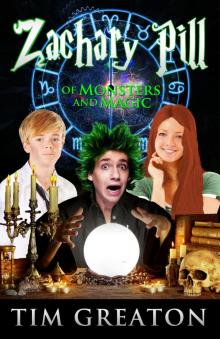 Zachary Pill, Of Monsters and Magic
Zachary Pill, Of Monsters and Magic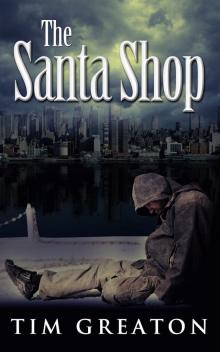 The Santa Shop
The Santa Shop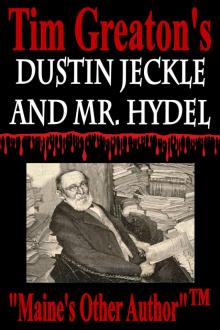 Dustin Jeckle & Mr. Hydel
Dustin Jeckle & Mr. Hydel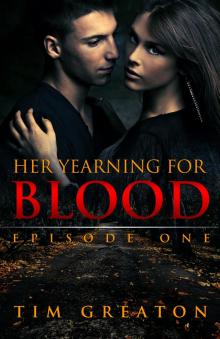 Her Yearning for Blood: Episode One
Her Yearning for Blood: Episode One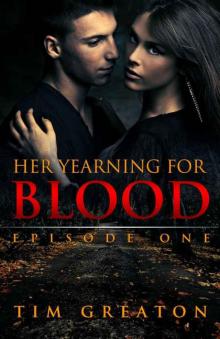 Her Yearning for Blood
Her Yearning for Blood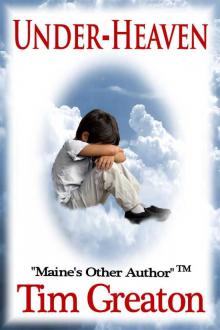 Under-Heaven
Under-Heaven